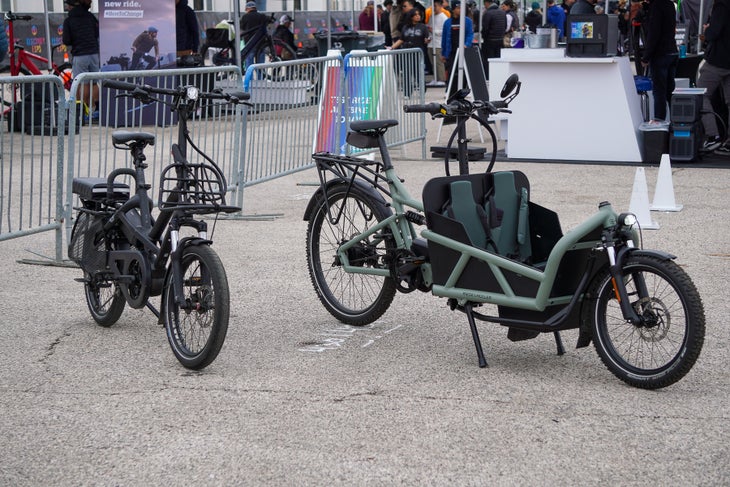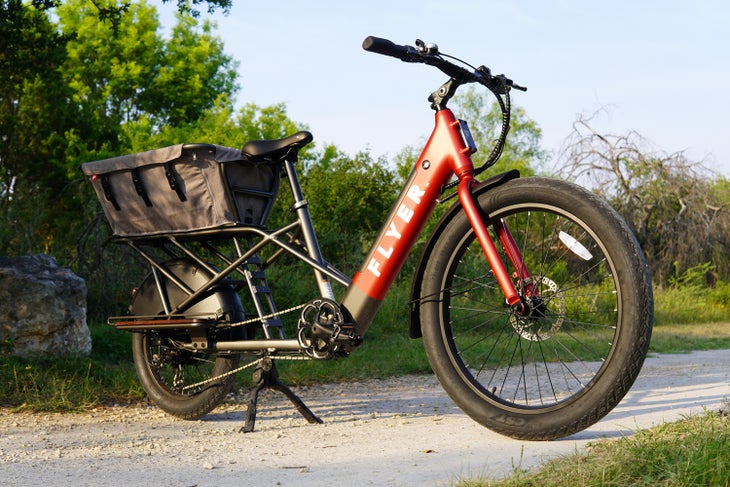Heading out the door? Read this article on the new Outside+ app available now on iOS devices for members! Download the app.
A recent study published in Transportation Research Part F: Traffic Psychology and Behaviour found that people tend to rate cargo bikes higher than cars in nearly every category.
Among other things, the results indicate that cargo bikes – and cargo bike sharing systems – have a notable impact on car ownership. “Duh,” you’re probably saying to yourself. “Of course someone using a cargo bike will cut down their car ownership! You don’t buy a cargo bike to not use it.”
What’s more interesting is that surveyed people agreed that cargo bikes are better than cars across nearly all aspects, regardless of whether the person was considered car-dependent or had reduced car ownership outright.
When people had access to a cargo bike, be it through a sharing system or people see the benefits of a cargo bike against a car and likely would make the switch if conditions were more favorable.
So what happened when people had access to cargo bikes, either via their personal bikes or via a bike share system? Car ownership was reduced by up 18.1 percent, along with a slew of other impacts. Here’s why these results matter.
The results in a nutshell
The survey consisted of 2,590 people who had participated in a cargo bike share system in Germany, which allowed folks to pay a fee or membership for access to a cargo bike. Similar cargo bike share schemes exist in other parts of the world. North America has precious few options, though there are options like Let’s Go Cargo in Ottawa, Ontario, and Xtracycle’s rental service in Mill Valley, California.
45.8 percent of the people in the survey had at least one car in their household, while 54.2 percent of people lived car-free. 2,590 users from 58 initiatives in Germany were polled, split by whether or not they indicated cars as their main mode of transportation. Those who indicated cars as their made travel mode were labeled as ‘car-dependent.’
The key findings:
- Up to 18.1 percent of those surveyed say they’ve reduced their car ownership by at least one car, either by getting rid of one of their own cars or deciding against buying one.
- Of those 18 percent, 80 percent of those surveyed reduced or outright abolished their car usage have done it for environmental reasons.
- 48.8 percent of people reduced their car ownership and took to a cargo bike for financial reasons.
- 9.9 percent reduced their car ownership due to the risks associated with driving a car.
Of those 2,590 polled, 38 percent of the car-reduced group were women compared to 46 percent of car-dependent folks.
Cargo bikes rated higher than cars in just about every aspect, regardless of whether or not the user lived a car-reduced lifestyle or a car-dependent one.
Just 38 percent of the car-reduced group were women, compared to 46 percent of car-dependent folks.
The study also alludes to the idea that cargo bike share systems are more effective at reducing car ownership than a car sharing system is, though they are quick to note that more research must be done for a conclusive conclusion.
Why are more people taking to cargo bikes?

The study revealed things that many people who use a cargo bike regularly already know: they’re low-stress, they’re easier to use, and they’re far less expensive than cars.
Most people who reduced car ownership and replaced trips with a cargo bike saw numerous benefits. Among them, cargo bike users found their bikes brought lower stress and greater pleasure in addition to being far better for the environment by using fewer resources and offering less greenhouse gas emissions.
Car-dependent users considered cargo bikes superior to cars on price, lower stress, and pleasure. However, they stuck steadfastly to cars when it came to flexibility, traffic safety, travel speed, and weather-independence.
Both groups agreed that cargo bikes were better than cars for social recognition, self-expression, and environmental friendliness, though the cargo bike users ranked environmental factors considerably higher for why they go by cargo bike rather than by car.
In short, users in the study who reduced their car usage for a cargo bike care enough about environmental friendliness that they’re willing to forgo the higher travel speed, greater comfort, and additional weather independence that a car offers.
What does this mean for getting more people into cargo bikes and out of cars?

An 18.1 percent reduction in car ownership doesn’t seem like a whole lot. That 18.1 percent fewer cars means 18.1 percent less traffic on the roads, however. It’s not a big number, but it certainly matters, particularly in areas with lots of car traffic.
The folks surveyed in the study participated after using a cargo bike share system, which exposed them to how a cargo bike could fit into their day-to-day. Most car trips are short – about 60 percent of them are less than six miles in the U.S. – which makes a cargo bike a worthy alternative for most trips. Without exposure, the average person in this study wouldn’t understand just how easy going by bike could be.
Car-dependent users did not seem to care about everything the car-free users cared for, namely environmental friendliness, resource conservation, and lowering their greenhouse gas emissions. What they did care about was speed, comfort, and traffic safety. Future legislation and focus on encouraging bike usage will have to focus on those three things.
I had a large pick up at Home Depot today but their website was wrong and I had to order. I left and picked up three bags of groceries and some dog food.
Trip chaining and errand running is one of the hardest parts of active transpo, and cargo bikes make a world of difference. pic.twitter.com/npP85hFngs
— Dustin (@EngineerDustin) January 27, 2024
A bicycle isn’t going to beat a car in a drag race. Not even an e-bike will beat a car in those situations. One place, however, where a bike can beat a car in regard to speed is through clever city design. Low-cost choices like allowing a leading pedestrian interval (as we recently covered) are an inexpensive way to give cyclists a head start on traffic.
Comfort is a bit more subjective. Like it or not, most cars are easier to use for the average person than a cargo bike, and that’s before you consider that most people find the hard things about driving a car – driving in traffic, parking, worrying about maintenance, etc – are second-nature to everyone who grows up around cars. They’re comfortable doing the hard things, none of which are an issue on a cargo bike.
Comfort can also be attributed to straight-up comfort on the bike. Finding the right seat and position can be tough if you don’t have someone to guide you in the right direction. If you’re uncomfortable on a bike, you’re likely not going to ride it, especially if you’re choosing between that and a car.
And safety? No, riding with reflective gear won’t necessarily make you safer. Nor will an e-bike license. What has been proven to make cycling safer is better bike infrastructure. Besides the aforementioned leading pedestrian interval, narrower streets and street art are inexpensive changes that bring about improved safety numbers.
This isn’t a car versus bike comparison. What it is is a recognition that at least in this study, everyone preferred riding a cargo bike to a car in nearly all aspects. We’ve harped on and on about cities needing to adapt as a means to a healthier, more environmentally sustainable city, but that won’t pull anyone but early adopters out of their cars and onto bikes.
Let’s build better cities simply because people prefer riding a cargo bike to driving when given the chance. Cargo bikes aren’t perfect, but if people want to do something that is collectively better than individual car trips, then cities need to adapt accordingly.
Welcome to the Urbanist Update. My job here might be as a tech editor, but I’ve also spent tons of time studying transportation, city planning, and engineering. Here are some of the things I’ve found interesting over the past week related to biking in cities, cycling infrastructure, and urbanism.
What is urbanism? In short, it is the study of how the inhabitants of an urban area interact with their towns and cities. If you care about building sustainable communities that let you live a happy and healthy life, then this is the spot for you. See previous Updates here.